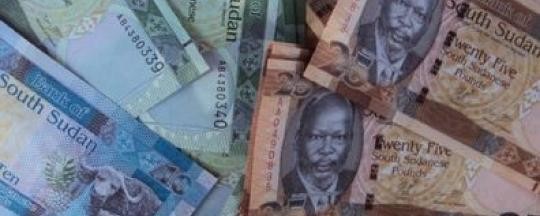Traders in South Sudan say the increasing black market price of the dollar against the South Sudanese pound has made it more difficult to import goods from foreign countries.
A streetside currency trader in Custom Market in Juba, said yesterday that he sells 100 USD for 495 SSP on the black market. He said that he gets his dollars from the Central Bank and later sells them at the black market rate in order to make profit.
Traders from Uganda, Kenya, Sudan, Somalia and Ethiopia, who have traditionally dominated certain trade sectors, have little access to dollar flows from the commercial banks or forex bureaus, which themselves rely on the Central Bank for their supply.
Forex bureaus such as ‘Raino’ in Juba Market sell dollars at a rate of 3.17 SSP but do not have a consistent supply of dollars from the Central Bank. Joyce Kiden, a worker at Raino bureau, said the office has had no dollars for three weeks.
Currently, South Sudan’s Central Bank sells 100 USD to commercial banks at 296 SSP, which then sell somewhat higher at about 317 SSP for 100 USD.
South Sudan’s central bank governor told Parliament recently that the official foreign exchange rate will increase from 2.96 South Sudanese pounds per US dollar to 4.50 to match the black market rate, with effect from next year.
Margret Juan, a trader selling bags of flour and beans at Custom Market told Radio Tamazuj that the currency shortage has resulted in doubling of the price of these goods from what they ought to be.
“I started selling this flour and beans since 2010 and the rate I was getting from black market compared to today has a very big difference,” said Juan.
Elizabeth Naburo, a Ugandan trader selling solar panel systems and devices in Gudele Market, said most of the hard currency she gets is from the black market. She said she thought the current conflict in the country has hurt the economy.
”Yes it’s true that a trader like me is supposed to have access to dollars at an affordable rate, not black market rate, so when I import my goods from Uganda the price will not be expensive which can affect my customers,” Naburo said.
She said that if the country’s crisis does not stop, she may close her shop and go back to Uganda until the country becomes stable.
Related coverage:
S Sudan central bank to increase forex rate after summons (19 Sept.)
Lawmakers call for investigation of South Sudan Central Bank (8 Sept.)
Kiir dismisses top South Sudan Bank official (27 Aug.)




